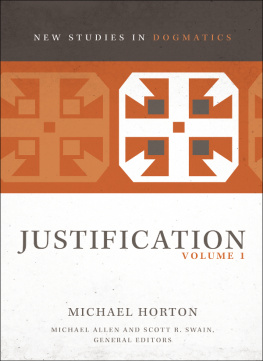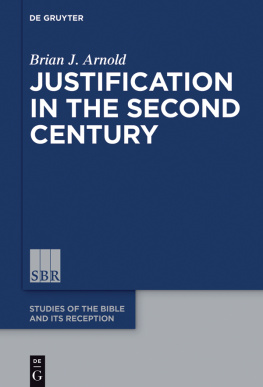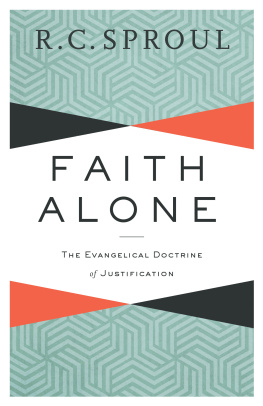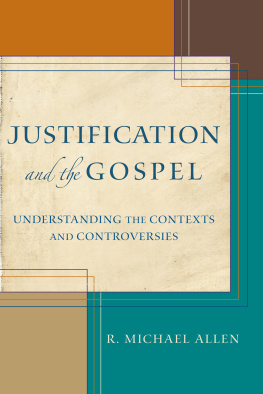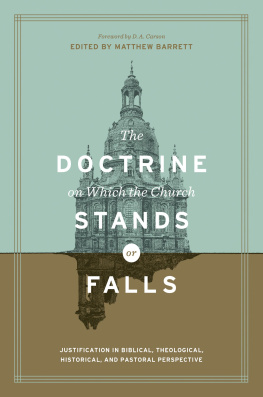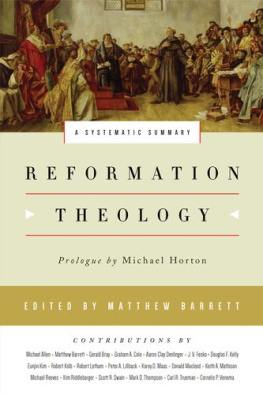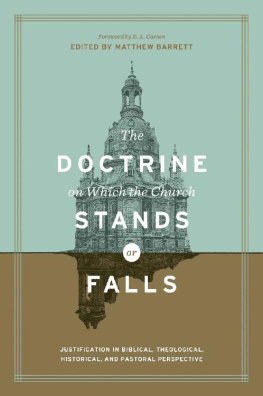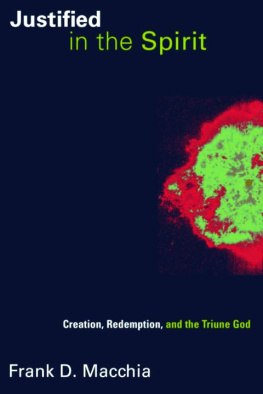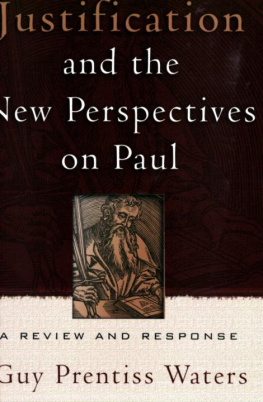Michael Scott Horton - Justification. Volume 1
Here you can read online Michael Scott Horton - Justification. Volume 1 full text of the book (entire story) in english for free. Download pdf and epub, get meaning, cover and reviews about this ebook. year: 2018, publisher: Zondervan, genre: Religion. Description of the work, (preface) as well as reviews are available. Best literature library LitArk.com created for fans of good reading and offers a wide selection of genres:
Romance novel
Science fiction
Adventure
Detective
Science
History
Home and family
Prose
Art
Politics
Computer
Non-fiction
Religion
Business
Children
Humor
Choose a favorite category and find really read worthwhile books. Enjoy immersion in the world of imagination, feel the emotions of the characters or learn something new for yourself, make an fascinating discovery.
- Book:Justification. Volume 1
- Author:
- Publisher:Zondervan
- Genre:
- Year:2018
- Rating:4 / 5
- Favourites:Add to favourites
- Your mark:
- 80
- 1
- 2
- 3
- 4
- 5
Justification. Volume 1: summary, description and annotation
We offer to read an annotation, description, summary or preface (depends on what the author of the book "Justification. Volume 1" wrote himself). If you haven't found the necessary information about the book — write in the comments, we will try to find it.
Justification. Volume 1 — read online for free the complete book (whole text) full work
Below is the text of the book, divided by pages. System saving the place of the last page read, allows you to conveniently read the book "Justification. Volume 1" online for free, without having to search again every time where you left off. Put a bookmark, and you can go to the page where you finished reading at any time.
Font size:
Interval:
Bookmark:
Respectfully yet relentlessly pressing Hortons many conversation partners in New Testament, this thorough, systematic, and far-ranging work advances a reading both distinctive and yet more traditional than many of todays dominant paradigms. Horton also exposes some of our blind spots, properly challenging mischaracterizations of the Reformers. In contrast to some New Testament scholars driven too much by modern philosophic premises, Horton is often more faithful to ancient interpretations relevant to the biblical cultures. As a New Testament scholar, I profited repeatedly from his historical context for various theological approaches in modern New Testament scholarship.
Craig Keener, F. M. and Ada Thompson Professor of Biblical Studies, Asbury Theological Seminary
This is a superb theological study that creatively retrieves the doctrine of justification from the patristic era to the Reformation. Horton seeks to revitalize the contemporary ecumenical discussion regarding justification by showing not only the enduring merits of the Reformations exegetical, theological, and pastoral legacy, but also its hermeneutical and theological superiority to alternative views, namely, Roman Catholic, Radical Orthodoxy, the new perspective on Paul, and new Finnish interpretations. Some of his interpretations are questionable, for example, the triumph of Nominalism occurred with the Counter-Reformation (Council of Trent) rather than with the Reformation. Still, I came away from reading this engaging book marked by a careful and generous listening to others, both reenergized with a passion for understanding the long-running doctrinal conversation about God, grace, and justification and challenged to engage critically the authors vision.
Eduardo J. Echeverria, professor of philosophy and systematic theology, Sacred Heart Major, Archdiocesan Seminary of Detroit
This is a serious and important work coming from a leading Reformed theologian. It concerns a pivotal doctrine that was at the heart of the Reformation and that continues to provoke differences between Protestants and Catholics. Both Protestant and Catholic readersnot only scholars but also theologically interested laitywill profit by wrestling with this learned historical study.
Gerald R. McDermott, Anglican Chair of Divinity, Beeson Divinity School
It is not often one finds a book ranging across the three CDsthe Damascus Document, Augustines City of God, and Barths Church Dogmatics! This is a volume bristling with theological insight and intellectual energy. Add to that Hortons learning and clarity, and you have that rare thinga gripping and intelligent treatment of justification.
Simon Gathercole, reader in New Testament, University of Cambridge, fellow and director of studies in theology, Fitzwilliam College
Doctrine, as the Reformers never tired of saying, flows from and leads back to Scripture. Michael Horton has demonstrated this thesis with Justification, a project that is at once a rich and rigorous exegetical investigation of the doctrine of justification and at the same time a model of theologically engaged scriptural interpretation. As all theology must, this book drinks from the well of Scripture as it walks the path of reading and doctrine towards the horizon of praise and proclamation. The result, both exegetically informed and theologically significant, is good news for your bones and mine (Luther): God justifies the ungodly in Christ, an unconditioned gift given in the word of promise that creates faith.
J. A. Linebaugh, lecturer in New Testament, Cambridge University, fellow, Jesus College
This work is very impressive and a major contribution to the clarification of the significant issues. Horton anchors his presentation of the Protestant Reformers teaching on the justification of the sinner in an extensive, carefully wrought exploration of the biblical roots, and he anchors conceptualizations of the relationship between sinners and their Creator within a covenantal framework that takes seriously both the sacramental nature of how God operates and the re-creative power of the gospel delivered by Christ. He challenges false interpretation of the Reformers understanding of justification with thorough, perceptive assessments of patristic and medieval doctrines of justification, providing an alternative that capitalizes on the sixteenth-century insights to address the twenty-first-century person in the midst of the turmoil of our times.
Robert Kolb, professor emeritus of systematic theology, Concordia Seminary, Saint Louis
SERIES EDITORS
Michael Allen, John Dyer Trimble Professor of Systematic Theology and Academic Dean, Reformed Theological Seminary, Orlando, Florida, USA
Scott R. Swain, President and James Woodrow Hassell Professor of Systematic Theology, Reformed Theological Seminary, Orlando, Florida, USA.
ADVISORY BOARD
John B. Webster, Professor of Divinity, St Marys College, University of St. Andrews, Scotland, UK
Kevin J. Vanhoozer, Research Professor of Systematic Theology, Trinity Evangelical Divinity School, Deerfield, Illinois, USA
Katherine Sonderegger, Professor of Theology, Virginia Theological Seminary, Alexandria, Virginia, USA
Henri Blocher, Professor of Systematic Theology, Facult Libre de Thologie vanglique, Vaux-sur-Seine, France
ZONDERVAN EDITORIAL ADVISOR
Katya Covrett, Executive Editor, Zondervan Academic
ZONDERVAN
Justification, Volume 1
Copyright 2018 by Michael Horton
Requests for information should be addressed to:
Zondervan, 3900 Sparks Dr. SE, Grand Rapids, Michigan 49546
ePub Edition October 2018: ISBN 978-0-310-49162-0
All Scripture quotations, unless otherwise indicated, are taken from the ESV Bible (The Holy Bible, English Standard Version). Copyright 2001 by Crossway, a publishing ministry of Good News Publishers. Used by permission. All rights reserved.
Scripture quotations marked NIV are taken from The Holy Bible, New International Version, NIV . Copyright 1973, 1978, 1984, 2011 by Biblica, Inc. Used by permission of Zondervan. All rights reserved worldwide. www.Zondervan.com. The NIV and New International Version are trademarks registered in the United States Patent and Trademark Office by Biblica, Inc.
Any Internet addresses (websites, blogs, etc.) and telephone numbers in this book are offered as a resource. They are not intended in any way to be or imply an endorsement by Zondervan, nor does Zondervan vouch for the content of these sites and numbers for the life of this book.
All rights reserved. No part of this publication may be reproduced, stored in a retrieval system, or transmitted in any form or by any meanselectronic, mechanical, photocopy, recording, or any otherexcept for brief quotations in printed reviews, without the prior permission of the publisher.
Cover design: Micah Kandros Design
Interior design: Kait Lamphere
18 19 20 21 22 23 24 25 26 27 28 /DHV/ 15 14 13 12 11 10 9 8 7 6 5 4 3 2 1
Information about External Hyperlinks in this ebook
Please note that footnotes in this ebook may contain hyperlinks to external websites as part of bibliographic citations. These hyperlinks have not been activated by the publisher, who cannot verify the accuracy of these links beyond the date of publication.
New Studies in Dogmatics follows in the tradition of G. C. Berkouwers classic series, Studies in Dogmatics, in seeking to offer concise, focused treatments of major topics in dogmatic theology that fill the gap between introductory theology textbooks and advanced theological monographs. Dogmatic theology, as understood by editors and contributors to the series, is a conceptual representation of scriptural teaching about God and all things in relation to God. The source of dogmatics is Holy Scripture; its scope is the summing up of all things in Jesus Christ; its setting is the communion of the saints; and its end is the conversion, consolation, and instruction of creaturely wayfarers in the knowledge and love of the triune God until that knowledge and love is consummated in the beatific vision.
Font size:
Interval:
Bookmark:
Similar books «Justification. Volume 1»
Look at similar books to Justification. Volume 1. We have selected literature similar in name and meaning in the hope of providing readers with more options to find new, interesting, not yet read works.
Discussion, reviews of the book Justification. Volume 1 and just readers' own opinions. Leave your comments, write what you think about the work, its meaning or the main characters. Specify what exactly you liked and what you didn't like, and why you think so.

